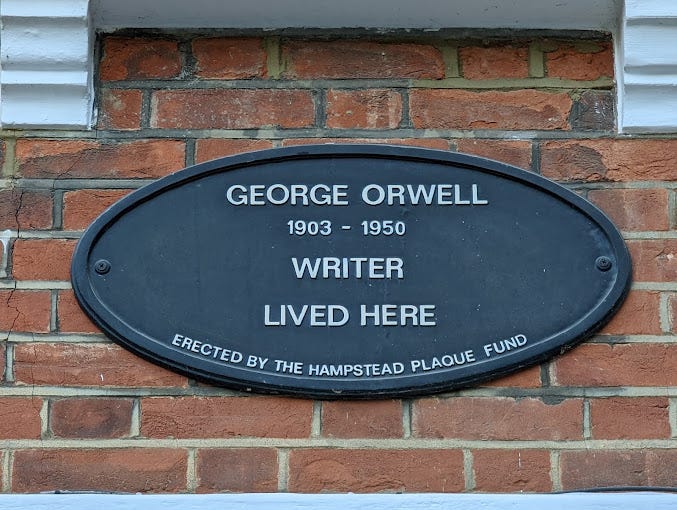Offer To Be There
Few things are as comforting as your physical and spiritual presence
Hey, it’s Alexandra. Welcome to my weekly newsletter where I share my latest reflections on professional development & well-being.
If you’re not a subscriber, here’s what you missed recently:
Pursue Your Art (this one failed to send to 162 of you last week)
Subscribe to get future posts emailed to you:
This week, I’m sharing:
A tactic to better manage conflict as a manager
A way to show support both personally and professionally
The benefits of not taking on the emotional burdens of others
☕️ Read time: 5 mins (best with tea or coffee)

A month ago, George Harrison caught my eye in a local Montreal shop. His latest biography propped up on display prompted a long overdue Beatles binge—specifically, on Harrison given my intrigue by the most “stylish” and “spiritual” member of the Fab Four.
London Life
I had my first brush with the Beatles in London, where I lived for two years from 2014 to 2016. I was busing home to my new flat on a red double-decker after a Sunday South of the River Thames. As we veered left onto a new street that jutted out at a forty-five-degree angle, I questioned why the area felt so familiar.
But as I spun around to glance out the rear-facing window, it hit me. The sight of people huddled on either side of the street rushing to pose on the crosswalk before the next car approached to pass was a dead giveaway.
Abbey Road.
I was enchanted by the casualness of encountering such an iconic, historical spot without preplanning. It was similar to when one of my flatmates and I stumbled upon George Orwell’s former home by Hampstead Heath (my favourite local park). We were casually strolling when I noticed the plaque pictured below.




My flatmate—a born and raised European—was surprised by my enthusiasm at discovering what I deemed a heavenly slice of history. “What’s the big deal?” he asked.
I laughed and explained that we don’t have an abundance of historical landmarks like the UK (and the rest of Europe) do in Canada. So to randomly find myself on Orwell’s former doorstep was incredible.
But back to Abbey Road, the Beatles, and more specifically, the ever-stylish and spiritual George Harrison.
Beatles Bid Adieu
In bingeing a variety of articles, interviews, and documentaries on Harrison in the past month, I’ve been utterly impressed by how ahead of his time he was. His depth was fascinating.
But my favourite story of all is how bandmate and lifelong friend Ringo Starr recounts Harrison’s final worlds to him. You can watch the one-minute clip or read the transcript below:
Video transcript:
“The last weeks of George's life, he was in Switzerland, and I went to see him, and he was very ill […] he could only lay down. And while he was being ill and I'd come to see him, I was going to Boston, cause my daughter had a brain tumour.
And I said, "Well, you know, I've got to go, I've got to go to Boston" and he goes... [chokes up], it's the last words I heard him say, actually... And he said:
"Do you want me to come with ya?"
Oh, God. [wipes away tears under his sunglasses] So, you know, that's the incredible side of George.
God, [laughs while crying] it's like Barbara fucking Walters here, isn't it?”
—Ringo Starr on George Harrison’s final words to him
I was so moved by this story (I highly recommend the heartwarming clip above). A simple offer to “be there” or “go with you” physically or spiritually in a moment of need is often what people need most—even if they don’t take you up on it.
People Problems
As much as people need this support in their personal lives, they also need it in their professional ones. Take, for instance, someone struggling with workplace conflict.
One of the most challenging, all-consuming elements of being a manager is managing conflict between teammates. Whether it’s a minor disagreement or a heated argument, it’s never fun when someone comes to you with a complaint about one of their peers.
I spent most of my career thus far thinking “A good manager swoops in to manage conflict any time someone comes to them with a complaint.” That is until I heard Nathan Barry speak at Running Remote in Montreal in May 2022.
ConvertKit CEO
Barry, who’s been running his remote-first company, ConvertKit, for over ten years now, gave a keynote on managing “people problems” and among several brilliant concepts he shared, was one on how to empower teammates to manage conflict themselves.
Barry explained that in his early years as a manager, he lost countless hours—often derailing entire workdays—resolving minor disagreements between direct reports. At the time, he thought being a good manager meant intervening whenever someone came to him upset about another colleague (a mindset I was still clinging to when I settled in for his talk two years ago).
Eventually, Barry realized his resolving every disagreement wasn’t helpful in the larger sense. Not only was it eating into valuable work time, but it made teammates dependent on him to resolve every difference of opinion. It was bottlenecking team progress through and through.
Simple Shift
Barry realized his company culture needed a simple shift. Here’s a summary of said shift in two slides:
In making the above shift a reality, Barry implemented a simple response so that anytime a colleague came to him with an issue regarding another teammate, he would say this:
“I assume you are bringing this to me for one of two reasons:
You want to talk through this. It helps to verbalize it and talk through it to understand what the problem is before you go and talk to that person; or
You’re worried about how that conversation might go and it might help to have someone there to help facilitate or make sure that it goes smoothly.
So which one is it?
When are you having the conversation and would you like me to be there?”
Barry says that every time he’s done this the person winds up saying “Oh you’re right, I do need to talk to this person directly. And no, I think I’ve got it. I don’t need your help facilitating.”
Then Barry says “Great. I’ll add it to our one-to-one agenda […] to follow up and find out how it went. [In the meantime], let me know if you need any help.”
Voilà.
Barry elaborates on the benefits of this shift from having managers intervene to empowering peer-to-peer conflict resolution below:
“If you don’t take on the emotional burdens of everyone on your team and instead you build a culture of clear, direct feedback where you’re saying “We’re not going to avoid problems, we’re going to work directly together,” you’re going to build a much healthier culture in the company.”
(You can watch Barry’s full keynote here. The portion on “people problems” begins at the 17:25 timestamp.)
Lastly, it goes without saying but it’s important, so I’ll say it anyway: please bear in mind this conflict management approach is suitable for minor issues. Serious matters requiring intervention from yourself or other members of senior management don’t apply. Use your discretion wisely.
Back to The Beatles
Let’s circle back to Ringo recounting George’s final words to him. When Ringo reminded George he had to go to Boston to be with his daughter, who had a brain tumour, George—on his death bed—said:
“Do you want me to come with ya?”
Naturally, Ringo was overcome by the memory as he wiped away tears under his sunglasses. It’s a powerful reminder of how comforting it is when someone offers to be there for you physically or spiritually in a moment of need.
We can take it upon ourselves to be there for others in that same way—whether it’s supporting them through a family tragedy or a tough conversation at work.
Much like my casual yet enchanting encounters with Abbey Road and Orwell’s house in London, this casual question can convey a profound sense of support:
“Do you want me to come with ya?”
Keep that in mind next time you want to help someone without taking on their emotional burden (the latter wouldn’t help them anyway).
Thanks for reading and have a wonder-full week,
💛 Like or comment if you enjoyed this edition.
☕️ Let me know if you visit Montreal & we can grab coffee or tea.




So much wisdom packed into just one article and so well written Alex - I’m truly impressed at your discipline and generosity in sharing these life lessons every week! Well done and thank you !
What a beautiful essay! The ending really hit me. I’m trying to think now of how I can offer that support to the people who are closest to me.